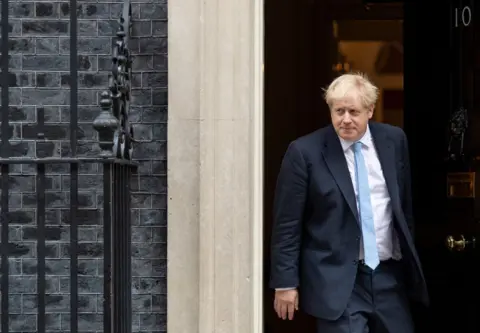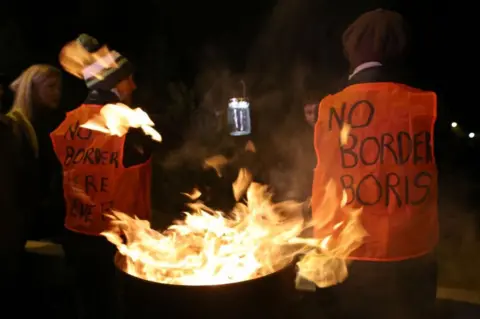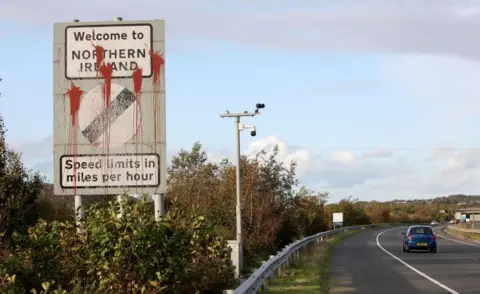Brexit: Nigel Dodds says Boris Johnson is 'too eager to get deal'
Boris Johnson was "too eager by far to get a deal at any cost," the Democratic Unionist Party deputy leader Nigel Dodds has said.
A Brexit deal, between the UK and EU, was struck on Thursday before a meeting of EU leaders in Brussels.
The DUP said it is "unable" to back the proposals in the Commons as they are not in the best interests of NI.
The party's support is seen as crucial if the deal is to pass in Parliament before the 31 October deadline.
Speaking alongside DUP leader Arlene Foster, Mr Dodds said the Benn Act, which requires the prime minister to ask for an extension if there is no deal by Saturday, had forced Mr Johnson into "desperation measures".
"If he'd held his nerve - held out - he would have got better concessions which kept the integrity, both economic and constitutional, of the UK," said Mr Dodds.
He said the DUP believed that since it had been proved that the Withdrawal Agreement could be changed, it "should be changed much more for the better".
He added that the issue of consent in the deal is a "major rewriting of the Belfast Agreement" adding it was "something anyone who has any concern for any kind of political process in Northern Ireland should be very, very concerned about".
Mr Dodds also said he expected a "massive vote" against Mr Johnson's deal on Saturday, and said the DUP would not be isolated on that.
'Consent is the cornerstone'
The UK and the EU have been working on the legal text of a deal but it will still need the approval of both the UK and European parliaments.
Speaking in Brussels, the EU's chief Brexit negotiator Michel Barnier described the consent proposal in the agreement as "a cornerstone of our newly agreed approach".
"Four years after entry into force of the protocol, the elected representatives of Northern Ireland will be able to decide by simple majority whether to continue applying relevant union rules in Northern Ireland or not," he said.
What has the reaction been in NI and the Republic of Ireland?
Speaking in Londonderry, the Northern Ireland Secretary Julian Smith said "we've abandoned nobody" when asked if the government had decided not to rely on the DUP's votes.
Taoiseach (Irish Prime Minister) Leo Varadkar, who is in Brussels for the EU summit, said: "It's up to the members of the House of Commons now to decide whether they want a deal."
Allow X content?
Sinn Féin president Mary Lou McDonald said a deal was a "least worst option" that would "only mitigate the worst effects of Brexit".
"The deal agreed today is complex and wide-ranging and all aspects need to be considered in their entirety," she added.
Ulster Unionist Party (UUP) leader Robin Swann said the deal would "place Northern Ireland on the window ledge of the union".
He said unionist MPs should "think long and hard" before voting on the deal, adding: "What's more important? The pursuit of a puritanical Brexit or the security and integrity of the union?"
 Dan Kitwood
Dan KitwoodSDLP leader Colum Eastwood appealed to the DUP not to "shoot this down" because the alternative was a no-deal Brexit that would be a "threat to our peace process".
"[The DUP has] a responsibility to the farmers, to the business community, to the ordinary community out there to get this resolved," he added.
Alliance Party leader and MEP Naomi Long said she wanted the prime minister to put the deal to the public in a referendum.
"If the DUP are not willing to provide the arithmetic to get a deal through Parliament then I think Boris Johnson would be right to go to the public."
Conservative MP and Brexit supporter Iain Duncan Smith said he would "reserve judgement" on the deal until he had read the detail of it.
He said: "There are issues - if the DUP aren't backing it, what are their reasons for not backing it?"
What does the deal involve for NI?
The Brexit deal struck in Brussels would involve Stormont giving ongoing consent to any special arrangements for Northern Ireland.
It would not be the unionists' veto demanded by the DUP - instead the arrangements could be approved by a straight majority.
Pro-EU parties have a narrow majority at Stormont.
 AFP
AFPIt would continue to follow EU rules on food safety and product standards.
The DUP has already accepted that Northern Ireland would have to align with some EU rules to avoid a hard border.
Northern Ireland would also leave the EU customs union.
But EU customs procedures would still apply on goods coming into Northern Ireland from Great Britain in order to avoid checks at the border.
Stormont would have to approve those arrangements on an ongoing basis.
Approval would involve a straight-forward majority, which would keep the special arrangements in place for four years.
 AFP
AFPAlternatively, if the arrangements are approved by a majority of nationalists and a majority of unionists, they would remain in place for eight years - that would incentivise a cross-community consensus.
If the Northern Ireland Assembly voted to end the arrangements there would be a two-year notice period, during which the UK and the EU would have to agree ways to protect the peace process and avoid a hard border.
There is no fallback position in case the two sides cannot find a solution.
If a vote was not held - by choice or because the assembly was not sitting - then the government has committed to finding an "alternative process".
The EU believes that replaces the backstop - which would have lasted "unless and until" an alternative was found - with arrangements that are sustainable over time and are democratically supported, as requested by the UK.
